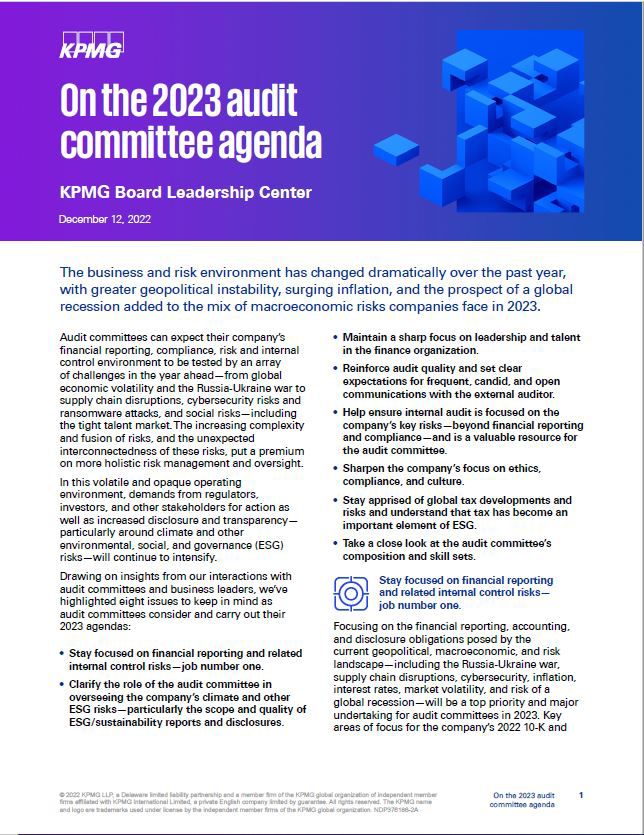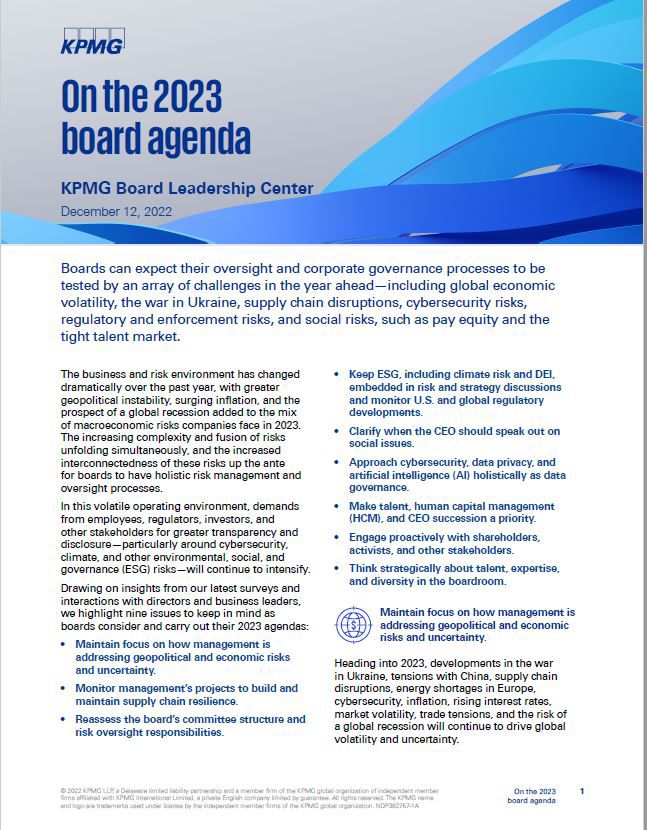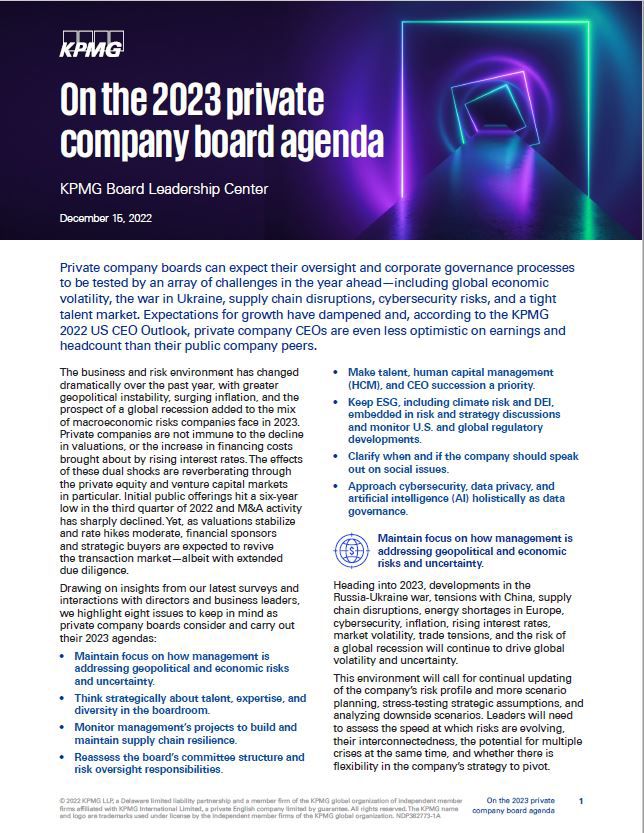On the 2023 audit committee agenda
The business and risk environment has changed dramatically over the past year, with greater geopolitical instability, surging inflation, and the prospect of a global recession added to the mix of macroeconomic risks companies face in 2023.
Audit committees can expect their company’s financial reporting, compliance, risk and internal control environment to be tested by an array of challenges in the year ahead – from global economic volatility and the Russia-Ukraine war to supply chain disruptions, cybersecurity risks and ransomware attacks, and social risks – including the tight talent market. The increasing complexity and fusion of risks, and the unexpected interconnectedness of these risks, put a premium on more holistic risk management and oversight.
In this volatile and opaque operating environment, demands from regulators, investors, and other stakeholders for action as well as increased disclosure and transparency – particularly around climate and other environmental, social, and governance (ESG) risks – will continue to intensify.
Drawing on insights from our interactions with audit committees and business leaders, we’ve highlighted eight issues to keep in mind s audit committees consider and carry out their 2023 agendas:
- Stay focused on financial reporting and related internal control risks – job number one.
- Clarify the role of the audit committee in overseeing the company’s climate and other ESG risks – particularly the scope and quality of ESG/sustainability reports and disclosures.
- Maintain a sharp focus on leadership and talent in the finance organization.
- Reinforce audit quality and set clear expectations for frequent, candid, and open communications with the external auditor.
- Help ensure internal audit is focused on the company’s key risks – beyond financial reporting and compliance – and is a valuable resource for the audit committee.
- Sharpen the company’s focus on ethics, compliance, and culture.
- Stay apprised of global tax developments and risks and understand that tax has become an important element of ESG.
- Take a close look at the audit committee’s composition and skill sets.
On the 2023 board agenda
Boards can expect their oversight and corporate governance processes to be tested by an array of challenges in the year ahead—including global economic volatility, the war in Ukraine, supply chain disruptions, cybersecurity risks, regulatory and enforcement risks, and social risks, such as pay equity and the tight talent market.
The business and risk environment has changed dramatically over the past year, with greater
geopolitical instability, surging inflation, and the prospect of a global recession added to the mix of macroeconomic risks companies face in 2023. The increasing complexity and fusion of risks unfolding simultaneously, and the increased interconnectedness of these risks up the ante for boards to have holistic risk management and oversight processes.
In this volatile operating environment, demands from employees, regulators, investors, and
other stakeholders for greater transparency and disclosure—particularly around cybersecurity, climate, and other environmental, social, and governance (ESG) risks—will continue to intensify. Drawing on insights from our latest surveys and interactions with directors and business leaders, we highlight nine issues to keep in mind as boards consider and carry out their 2023 agendas:
- Maintain focus on how management is addressing geopolitical and economic risks and uncertainty.
- Monitor management’s projects to build and maintain supply chain resilience.
- Reassess the board’s committee structure and risk oversight responsibilities
- Keep ESG, including climate risk and DEI, embedded in risk and strategy discussions and monitor U.S. and global regulatory developments.
- Clarify when the CEO should speak out on social issues.
- Approach cybersecurity, data privacy, and artificial intelligence (AI) holistically as data governance.
- Make talent, human capital management (HCM), and CEO succession a priority.
- Engage proactively with shareholders, activists, and other stakeholders.
- Think strategically about talent, expertise, and diversity in the boardroom
On the 2023 private company board agenda
Private company boards can expect their oversight and corporate governance processes to be tested by an array of challenges in the year ahead—including global economic volatility, the war in Ukraine, supply chain disruptions, cybersecurity risks, and a tight talent market. Expectations for growth have dampened and, according to the KPMG 2022 US CEO Outlook, private company CEOs are even less optimistic on earnings and headcount than their public company peers.
The business and risk environment has changed dramatically over the past year, with greater geopolitical instability, surging inflation, and the prospect of a global recession added to the mix of macroeconomic risks companies face in 2023. Private companies are not immune to the decline in valuations, or the increase in financing costs brought about by rising interest rates. The effects of these dual shocks are reverberating through the private equity and venture capital markets in particular. Initial public offerings hit a six-year low in the third quarter of 2022 and M&A activity has sharply declined. Yet, as valuations stabilize and rate hikes moderate, financial sponsors and strategic buyers are expected to revive the transaction market – albeit with extended due diligence.
Drawing on insights from our latest surveys and interactions with directors and business leaders, we highlight eight issues to keep in mind as private company boards consider and carry out their 2023 agendas:
- Maintain focus on how management is addressing geopolitical and economic risks and uncertainty.
- Think strategically about talent, expertise, and diversity in the boardroom.
- Monitor management’s projects to build and maintain supply chain resilience.
- Reassess the board’s committee structure and risk oversight responsibilities.
- Make talent, human capital management (HCM), and CEO succession a priority.
- Keep ESG, including climate risk and DEI, embedded in risk and strategy discussions and monitor U.S. and global regulatory developments.
- Clarify when and if the company should speak out on social issues.
- Approach cybersecurity, data privacy, and artificial intelligence (AI) holistically as data governance.
For more information, download the full report below.
The information contained herein is of a general nature and is not intended to address the circumstances of any particular individual or entity. Although we endeavor to provide accurate and timely information, there can be no guarantee that such information is accurate as of the date it is received or that it will continue to be accurate in the future. No one should act on such information without appropriate professional advice after a thorough examination of the particular situation.



